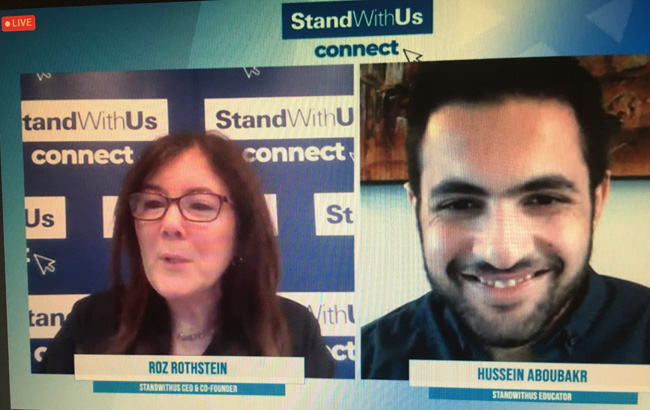San Diego Jewish World
Donald H. Harrison
June 14, 2020

Hussein Aboubakr, an Egyptian born Muslim who is now a United States citizen and an avowed Zionist, told of his life in a Zoomcast for StandWithUs members previewing a 40-minute documentary movie, A Minority of One, that will premiere Monday, June 22 via this website.
If I were making a movie from the story that he calmly told about the dramatic events in his life that led him to transform himself from a propaganda accepting Jew-hater to an independent, inquiring, young Arab man, who learned there was much about Jews and Israel to admire, I believe I would start with a flashback scene. It would show, as happened in real life, Aboubakr leaving a meeting with a group of inquisitive and friendly Jewish middle schoolers and walking to a place where he could be by himself and feel sad enough to be near to tears.
Had he not, when he was the same age as these children, been taught to hate people like them, to want even to become a jihadist to even kill them? he shuddered to himself.
Aboubakr’s life had not turned around immediately. After September 11, 2001, when the U.S went to war in Iraq, and Israel was responding to the Second Intifada, Aboubakr said he thought that Muslims were being slaughtered everywhere and he wanted to take action against Jews. To do so effectively, he believed, he needed to learn about their culture, and their language, which he studied at a section of the University of Cairo as well as on the Internet. But at the university, in contrast to what he was reading on the Internet, he said, he received the same hate-filled messages which Egyptian Muslims hear about Jews in their mosques, schools, political speeches, entertainment, even music videos.
He decided to seek other sources and one day went to the Israeli Academic Center, which had been established in Cairo after the peace deal was signed in 1979 by Egyptian President Anwar Sadat and Israeli Prime Minister Anwar Sadat. There he met a Jew for the first time in his life, and had a friendly conversation with him. For a moment, he was euphoric. But back out on the street, he was approached by a member of Egyptian State Security who questioned him for 15 minutes, asking not only why he was talking to the Jews, but also about who were his family members and his friends..
Terrified, but defiant, Aboubakr wrote about the experience on his Internet blog, which led to a request from Israel’s YNet news for an interview, which, Aboubakr accepted, without regard to his safety. Three days later he and his father were arrested by Egyptian police who, ironically, were armed with Israeli-made Uzis.
His father, knowing nothing about his son’s activities, apologized to the police, yelled at Aboubakr and not long after they returned home, his family made the decision that if Aboubakr didn’t change his ways, he must live somewhere else. Upon his graduation from college, he was supposed to be enlisted in the Egyptian Army, but instead of boot came, he was sent for two months to a detention camp where he reported he was beaten every day. The message from his guards? “You Jew lover — no one is going to help you now.”
He had hoped that the Arab Spring might result in a change in thinking in his country, but it wasn’t long after Hosni Mubarek was ousted as president, that the Muslim Brotherhood was able to install as president Mohamed Morsi whose regime, if anything, was more repressive than Mubarek’s, with the burning of Coptic churches and open expressions of anti-Semitism. In 2012, with the help of Christian friends, Aboubakr flew to the United States where he asked for political asylum. He found his way to Southern California, at first sleeping at a Coptic church, and then embarrassed by taking charity, sleeping on the streets. Eventually, his asylum was approved, and he got a job at the Defense Language Institute in Monterey, California teaching Hebrew — an unusual occupation for a native Arab speaker.
After becoming a U.S. citizen and gaining an American passport, he traveled as a tourist to Israel, visiting the Tel Aviv University office of scholar Shimon Shamir who was one of the founders of the Israel Academic Center in Cairo. Aboubakr said that he never felt freer to express his Middle Eastern culture than he did in Israel. To his knowledge, he said, no other Arab in the Middle East has the freedom that an Israeli Arab does.
After his return to California, he met Roz Rothstein, the co-founder and chief executive officer, of the StandWithUs organization, who persuaded him to talk about his life to students. At first, he said, he thought perhaps he didn’t have anything to say that might be of interest to them, but the enthusiastic receptions he has since received have proved him wrong. Today he is a regular speaker, declaring that if he could change his opinions about Jews and Israel, so too could anyone. “Hatred and anti-Semitism are purely phenomena of ignorance,” he stated.
Read the article here.




